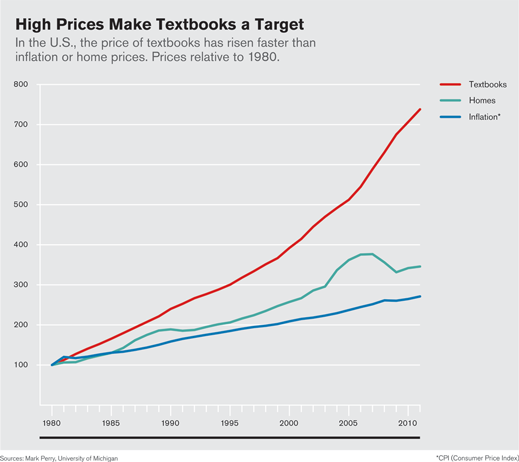Prices for textbooks in the U.S. are, for the most part, outrageous. Particularly within higher education. The annual costs for books and supplies for college students averages $1200. The old reasons for high cost given to the public - low press runs and higher print-setting costs (due to use of wider range of symbols and languages) - don't apply in today's publishing world. Yet even as costs decline, textbook prices have skyrocketed. Which leaves one primary explanation for continued price increases well above inflation rates - a captive market. Instructors assign required texts, and students have to buy them - whatever the cost. So textbook publishers feel they can easily raise prices. And when the market for used texts boomed, their response was to push up the frequency of revisions to restrict that market challenge.
The rapid increase in prices for textbooks has had some consequences - a number of universities and colleges (mine included) have adopted policies asking instructors to consider textbook prices when assigning them. Others (again, mine included) have encouraged development of reading packs and texts for classes, and subsidized their production to keep costs low, and/or have established online book imprints for low-cost or free distribution - a California law will require the development of free online textsbooks for the 50 most popular courses in state colleges and universities. And I'll note that two major academic publishers, Oxford University Press and MIT Press, have undertaken to make many of their texts available in more affordable trade versions. While all of these approaches have been helpful, textbook prices continue to rise.
(I recently looked around for a text for a new course I'll be teaching - and the most appropriate text was $160, and the other viable alternative was also over $100. I'm ancient enough to recall that in college, $100 was usually enough to get the books needed for 4-5 courses per semester. In grad school it rose to $150; maybe $200 if I also bought the recommended texts. And I typically spent more at used book stores, building up my library. But today, I can't justify (at least to myself) asking my students to fork over $160 for a text.)
The rise of eBooks, including the rapid diffusion of eReaders (and now tablets), has opened the door for digital textbooks. eBooks have several advantages that textbooks could exploit - they're cheaper to produce and market, the publication process is significantly faster (and allows for near-realtime updating), and can easily include multimedia and links to online resources. Mainstream textbook publishers have slowly tested the market, but tend to keep prices absurdly high (to minimize impact on print markets). Prices for e-Texts, however, don't need to be high - they are relatively cheap to create (mostly authors' time and effort) and very cheap to distribute. Apple's pushing to keep textbook costs under $10). And some of the major eBook retailers (Apple, Amazon), along with the FCC and U.S Dept. of Education, are encouraging the development of affordable online texts. (We've just started the Tennessee Journalism Series here at UT - four short texts now, with many more in development).
And now there's the booming OpenSource textbook movement. Some of the boom is in the form of open-source publishers like Boundless Learning, which uses open-source materials to assemble their own versions of popular textbooks. Boundless is currently being sued by a group of large academic publishers for allegedly engaging in a "business model of theft." Some are the results of state and foundation supported efforts, like the California Open Source Textbook Project, CK-12, Merlot, and OpenStax. Others build from University-sponsored efforts to promote free online access to their courses, like MIT's OpenCourseWare project and the University of Illinois' Open Source Textbook Initiative. At the heart of these efforts is the notion of pulling together and building on existing educational materials, and facilitating their online publication and distribution.
And then there's people like me and my colleagues at the Tennessee Journalism Series - senior professors who have textbooks in our heads but have dreaded the time and effort involved in getting a book contract from an academic publisher, and then going through the full publication process (and more important, the relatively low rewards for that effort in terms of getting tenure or annual reviews at research universities). Apple, Amazon, and open-source textbook initiatives have vastly simplified the process - so it's time to open the floodgates. Besides, for most of it, the reward is in getting our work recognized and used - and high prices in academic publishing (both books and journals) get in the way. Going open-source can facilitate wider access and use, and thus increased recognition.
As more and more of us go to open-source, the greater the competition for mainstream texts. That should at least slow down price inflation, if not create a force for price moderation. I'll looking forward to the transition. Now only if I could get those dang books out of my head.
Source - Free Textbooks Spell Disruption for College Publishers, MIT Technology Review


No comments:
Post a Comment